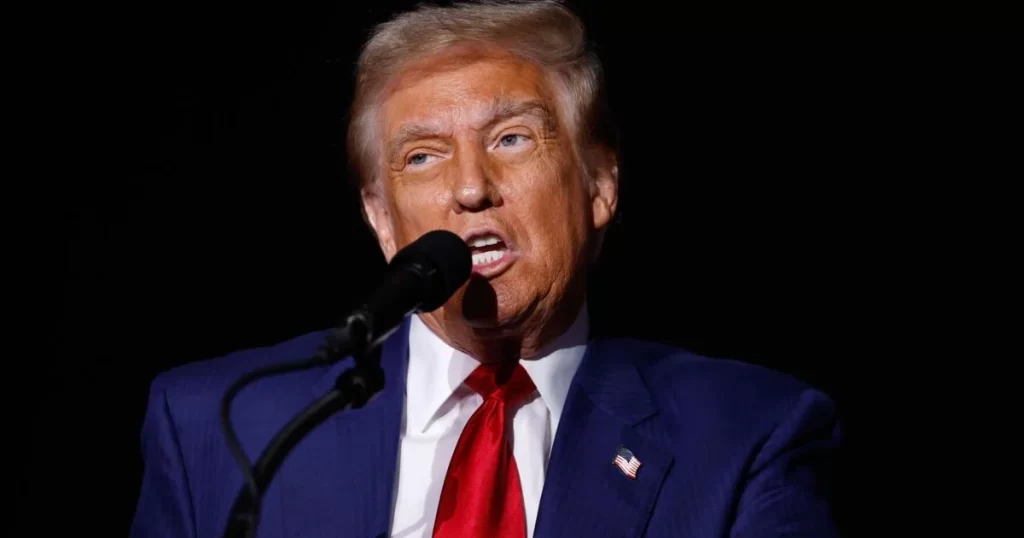Trump Proposes Ending Federal Income Tax: What It Could Mean for Americans
3 min read
Former President Donald Trump is stirring controversy with his recent proposal to eliminate the federal income tax, a move that has raised eyebrows and sparked debate as Election Day approaches. In interviews this week, Trump revisited the concept of replacing income tax with tariffs, drawing on historical precedents from the late 19th century when the U.S. primarily relied on tariffs for revenue.
During a segment aired on Fox News, Trump spoke to barbers in the Bronx, New York, and suggested that eliminating the federal income tax is feasible. “When we were a smart country, in the 1890s… this is when the country was relatively the richest it ever was. It had all tariffs. It didn’t have an income tax,” he said, asserting that current tax burdens are detrimental to Americans.
In another interview with Joe Rogan on “The Joe Rogan Experience,” Trump reaffirmed his stance, saying, “Yeah, sure, why not?” when asked if he was serious about replacing federal income taxes with tariffs. While he has hinted at scrapping income tax before, it remains unclear whether he intends to eliminate just the individual income tax or corporate income and payroll taxes as well.
Currently, the federal income tax accounts for approximately half of the nearly $5 trillion in revenue the government collects annually, while tariffs contribute around 2%. Trump’s campaign senior adviser Jason Miller indicated that eliminating the income tax could be an “aspirational goal,” but emphasized that Trump’s immediate priorities include extending provisions from his 2017 Tax Cuts and Jobs Act and implementing targeted tax cuts.
The Tariff Proposal: Risks and Challenges
Trump’s economic strategy for a potential second term hinges heavily on tariffs. He has proposed a sweeping tariff of 10% or 20% on all imports to the U.S., with a staggering 60% tariff on all Chinese imports. Trump insists that these tariffs would fund his ambitious proposals, arguing that foreign countries would bear the cost rather than American consumers. However, many budget experts are skeptical of this assertion.
Erica York, a senior economist at the Tax Foundation, called Trump’s plan “absurd,” emphasizing that it is “mathematically impossible” to replace income tax revenue solely with tariffs. “Imports are a much smaller tax base than taxable income, and there’s no way to squeeze enough revenue from taxing imports to fully replace taxing income,” York explained. She warned that a shift like this would likely increase taxes on working-class families and provoke retaliatory measures from other nations against U.S. exports.
Brian Riedl from the Manhattan Institute echoed these concerns, stating that fully replacing the $2.4 trillion in income taxes would necessitate an unrealistic 75% tariff on America’s $3.2 trillion in annual imports. Riedl pointed out that this scenario assumes Americans would continue purchasing the same amount of imported goods even at nearly double the price, which is highly unlikely.
Moreover, during Trump’s first term, he had to allocate funds raised from tariffs to support industries like agriculture, which suffered due to retaliatory tariffs imposed by other countries. Riedl noted that the revenues from future tariffs might not lead to substantial net budget savings due to similar complications.
Economic Impact and National Debt
Even if the federal income tax were to be eliminated, experts estimate that Trump’s proposed economic package could add $7.5 trillion to the national debt over the next decade. A recent analysis from the Committee for a Responsible Federal Budget suggests that his tariffs could generate around $2.7 trillion over the same period, which falls significantly short of covering the potential deficit created by other tax cuts.
As the election approaches, Trump’s proposals are likely to remain a focal point of debate. While his supporters may view the elimination of federal income tax as a means to relieve financial burdens, many economists caution that the practical implications of such a shift could lead to increased costs for everyday Americans and exacerbate existing economic challenges.
In summary, while Trump’s proposal to end the federal income tax may resonate with some voters, the feasibility and implications of such a radical shift in tax policy raise critical questions about its impact on the economy and American families.






